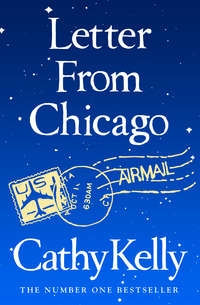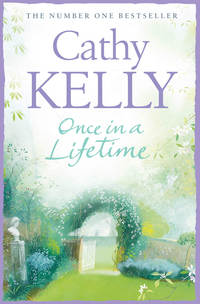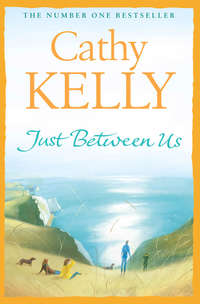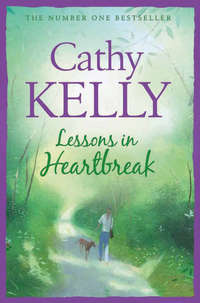
Полная версия
Cathy Kelly 6-Book Collection: Someone Like You, What She Wants, Just Between Us, Best of Friends, Always and Forever, Past Secrets
Hannah gulped as she tried to concentrate on what she simply had to do in the next hour. Packing and sorting out her guide books. She wanted to learn something from this holiday and she’d hoped to spend a while reading her Let’s Go: Egypt so that she wouldn’t embarrass herself in front of all the other people on the trip, people who probably knew about history and mythology…Then Jeff smiled a slow, lazy smile and traced one finger along her chest until it hooked under her towel and pulled, tumbling the towel to the floor along with her mental timetable.
Oh, what the hell, thought Hannah, letting her sex drive shift into fifth gear. After all those evenings trying to forget what physical pleasure had been like and watching endless re-runs of Inspector Morse, she deserved this. It wouldn’t take her that long to pack. She could read her guide book on the plane.
CHAPTER TWO
‘Lord! Would you look at the mess in here. I’m all for salads but you’ve really got to take them out of those awful little white plastic containers when you get them home. They leak everywhere. What’s this?’ Anne-Marie O’Brien squinted over her glasses at the supermarket label on the tub of couscous which had made an oily puddle in the middle of the otherwise spotless fridge. ‘Couscous? Messy, that’s what it is.’
Emma Sheridan said nothing as her mother searched for a clean J-cloth, rinsed it out in hot water and then zealously scrubbed the middle shelf of the fridge with the help of a bottle of antiseptic kitchen cleaner Emma had forgotten she’d possessed and had meant to throw out. An overpowering scent of pine disinfectant filled the room. It smelled nothing like any pine tree Emma had ever come across, unless pines were mating with bleach factories these days.
‘Much better now,’ Mrs O’Brien said, straightening up. She briskly rinsed the cloth out again, inspected the rest of the kitchen with narrowed eyes, then gave the melamine surfaces a quick squirt of cleaner, her every movement the work of an expert with a PhD in Cleaning the Home. Only then did she take the precious Tupperware and tinfoil-wrapped parcels and place them carefully in the fridge, giving her daughter a commentary on her actions at the same time.
‘Can’t have poor Peter eating that supermarket stuff. Proper dinners is what he should have. I know your father wouldn’t touch anything that had to be microwaved, but if I was away from him for a week, it’d be a different matter. Husbands! I’ve made lasagne that’ll last for at least two days, shepherd’s pie for tonight and these two are chicken and mushroom pies – I’ll put them in the freezer part. Emma, dear! Do you ever defrost this thing? It won’t do it itself. Never mind, I’ll just sort it out…’
Emma tuned out. Thirty-one-years of her mother had taught her that listening to the ‘nobody does things the right way, my way’ monologue would put you in a mental home if you didn’t tune out. Especially when the monologue was designed to tell you what a slatternly housekeeper/student/driver you were and how your poor husband would drop dead from salmonella if you didn’t start boil washing both the tea towels and his underpants immediately.
It was immaterial that Emma had spent most of the previous day cleaning and polishing Number 27 The Beeches from top to bottom; immaterial that she’d used up her precious day off work cleaning instead of swanning around the shops buying last-minute bits and bobs for her holiday. She’d toyed with the idea of going into Debenhams to see if she could get one of those black uplift bikinis she’d spotted in a magazine. Even if you were as flat as a pancake boob-wise, this bikini would give you a cleavage that’d take the sight out of people’s eyes, or so the magazine claimed.
As the only way Emma’s cleavage was going to take somebody’s eye out was if a wire from one of her AA cups escaped and actually poked them in the eye, she desperately needed a new uplift bikini.
But as usual, the only overdeveloped part of her person, namely guilt, had swung into action and put the kibosh on the shopping trip. Emma’s sense of guilt was like a medical textbook description of the heart: a large muscle which contracts unconsciously. Guilt at leaving Peter on his own at home for an entire week while she sailed down the Nile with her parents overcame her desire for a skilfully padded bikini, so she’d given Debenhams a miss and spring-cleaned the house instead. Peter, who wouldn’t notice if he had to eat his dinner off the table because they’d run out of plates, would be unaware of her feverish scrubbing. However, Emma’s Guiltometer had worked out that an entire day of cleaning would go a long way (fifty-five per cent) to making up for having a holiday without her beloved husband. Buying him an enormous present she couldn’t afford and cooking him his favourite dinners for a week after her return would almost compensate for the remaining forty-five per cent.
Sadly, she’d forgotten to buy new rubber gloves for the cleaning fest so her hands were now dry as an overcooked chicken thanks to scrubbing the toilet bowls with bleach. But the house was a veritable palace, with clean carpets, clean loos and not an unironed item of clothing anywhere.
All that and her mother was still tut-tutting over the only visible blemish in the entire premises. Emma could just picture Pete wrenching open the couscous and eating it with his finger beside the fridge that morning, shoving the greasy tub back in carelessly afterwards before grabbing the orange juice carton for breakfast. He adored couscous – and he hated shepherd’s pie with a vengeance. Still, what was the point of telling her mother that? Anne-Marie O’Brien wouldn’t listen: she never listened to anyone. Except her husband, James P. O’Brien, boss of O’Brien’s Heating Contractors, master of all he surveyed and the person who absolutely always had to have the last word on every subject.
Emma sat down wearily on one of her kitchen chairs and examined her newly painted nails. The rosy pink colour she’d bought for her holiday was pretty but still didn’t camouflage either the bleach damage or the nibbled bits. She’d chewed her index fingernail into an ugly stub during a long phone conversation the night before where her mother had fussed about the heat in Egypt, the food, the locals, the thought of covering up her shoulders at tourist sites and ‘…would your father be able to get proper milk for his tea.’ That idea had summoned up a bizarre mental picture of her father trying to milk a camel, him red and sweating as he stood with his teacup in one hand and a camel teat in the other.
She nibbled a stray sticking up bit of index fingernail. Well, who’d be looking at her bloody nails anyway. She felt too tired to care: she hoped she could sleep on the plane to Egypt. If she could steal one of her mother’s Valium tablets, she could blank out the entire journey.
While her mother busied herself with the fridge, Emma surreptitiously touched her breasts through the soft fabric of her denim dungarees. She’d been doing it all day, giving herself a pleasurable thrill that had nothing to do with sex. This thrill was provided by her biological clock heaving a sigh of relief. Nervously, she slid one hand under her T-shirt to reach her bare breast and touched it cautiously. Sensitive, definitely.
They’d looked bigger in the mirror earlier, she was sure of it. The nipples were bigger, weren’t they? Yes, yes, yes, she grinned. She was pregnant. It was quite incredible how happy she felt when she thought about the baby, her baby. The glow filled her up inside, like that advert for breakfast cereal where the boy cycling to school was lit from within because he’d eaten his Ready Brek that morning. Emma felt lit from within with a combination of sheer joy and relief. Relief that after so long hoping, it was finally happening. She wanted to dance around the room with delight, but her natural caution advised her to be careful. Say nothing to jinx it. Wait until you’re sure and then tell darling Pete the wonderful news, she told herself. All she had to do was get through the hateful week with her parents and then everything would be wonderful. Her secret would keep her going during the next week. It was only a week, after all.
Ignoring the ‘this place is a mess’ monologue, she picked up a pad from the table and began writing a quick note to Pete, telling him she loved him and would miss him desperately.
‘Well, madam, having a rest while your poor mother works as usual.’
The sound of her father’s voice made Emma jump to her feet guiltily. She felt as if she really was doing something wrong, the way she felt when she passed a police car with a radar gun out the window, even if she was only crawling along at thirty miles an hour. His very presence could plunge her into nervous tension, even now when she was so very hopeful about her precious baby.
‘Anne-Marie, there’s really no need to be doing Emma’s dirty work for her,’ Jimmy O’Brien said, treating his elder daughter to a disapproving stare. ‘She’s big enough and ugly enough to do her own housework. I won’t have you skivvying for her.’
‘I wasn’t skivvying,’ said her mother, her voice losing its liveliness and becoming weary.
‘Mother was just rubbing up something spilt,’ Emma protested, feeling all her good humour fade away as it so inevitably did whenever her father was involved. ‘I cleaned that fridge out yesterday…’
But her father was no longer listening. Striding over to the bin, he knocked out the old tobacco at the bottom of his pipe and began to fill his wife in on his recent activities.
‘I’ve filled the car with petrol, checked the air in the tyres and put in half a litre of oil,’ he announced. ‘We’re all shipshape, if you’re ready to go, Anne-Marie.’
You’d think we were driving to bloody Egypt, Emma thought with irritation.
For about the hundredth time since the trip had been booked, she wondered why she was going. It had been her father’s idea: the holiday of a lifetime to celebrate his and his wife’s thirty-fifth wedding anniversary.
Emma couldn’t figure out why he’d picked such an exotic destination as Egypt. Her father was a man who, for the past fifteen years, had been perfectly content to go to Portugal, sit watching sports coverage in a bar and comment loudly on how downmarket the place was getting what with all the football hooligans and brazen young girls running around with suitcases full of condoms looking for men.
‘Tarts,’ he’d say darkly every time a gang of carefree, tanned girls in skimpy T-shirts and bum-skimming shorts appeared on the scene.
Emma used to gaze wistfully at these modern babes: she was damn sure they wouldn’t still be going on holiday with their parents when they were in their twenties, too afraid of the furore to suggest a holiday with their boyfriends. Until she’d been married, she and Pete had only been away to the sun once when she’d pretended to be away with some girlfriends.
His comments about how young people’s standards were dropping notwithstanding, her father appeared to enjoy Portugal. But one holiday programme presenter enthusing over a Nile cruise had changed everything. Jimmy had ordered a vast assortment of brochures and spent many happy hours over Sunday lunch reading out the bits he was most interested in.
‘Listen to this,’ he’d say, blithely interrupting any other conversation with the insensitivity of a despot, ‘ “Enjoy the spectacle of Luxor and Karnak temples. Both monuments are perfect examples of ancient Egyptian architecture. Parts of Karnak Temple date back to 1375 BC.” That’s bloody incredible, we’ve got to go.’
Unfortunately, the ‘we’ also meant Pete and Emma.
‘No way, Emma. Why can’t they go on their own and just make each other miserable instead of making us all miserable,’ Pete complained, which was quite an out of character thing for him to say. Genuinely kind and warm, Pete couldn’t be nasty if he tried, but even his legendary patience was strained by her parents. Well, her father, really. Jimmy O’Brien strained a lot of people’s patience.
‘I know, love,’ Emma said wearily. She felt so torn; torn between doing what easy-going Pete wanted and what her domineering father wanted. ‘It’s just that he hasn’t stopped talking about it and he’s assuming we’ll go too. He’ll harp on about how ungrateful we are if we don’t go.’ Emma didn’t need to say any more. Ever since her father had loaned herself and Pete the deposit money for their house, he’d been holding it over their heads like a sword of Damocles.
Going out with friends for Sunday instead of going to the O’Briens’ for lunch was seen as a sign of ungratefulness. So was being too busy to pick up Jimmy’s new bifocals from that shop in town, or not being able to drive Anne-Marie to the shops because she’d got nervous about driving her own car for some unaccountable reason. The way things were going, the next time Emma refused a liquorice on the grounds that she didn’t like the taste, that too would be seen as ungratefulness.
Pete said nothing more about the trip. Emma knew he wanted her to stand up to her father for once and refuse to go so that they could spend the money going away together later. But Emma, who knew she’d feel guilty about leaving Pete but would suffer ten times more if she crossed Jimmy O’Brien, finally figured out a solution.
‘Pete can’t go to Egypt that week, Dad,’ she lied. ‘He’s got a two-day conference in Belfast. But I’ll go – won’t that be nice, just the three of us together, like old times?’
The old times reference did the trick. Which was ironic, Emma thought. Her memory of bygone holidays consisted of the feeling that they’d merely changed the setting for her father’s daily sarcastic remarks. But, hilariously, he didn’t see it like that: Jimmy was delighted with the holiday plan.
Pete was staying at home, sweetly telling Emma that it was all right, he’d go away with the lads for a football weekend later in the year, so she wasn’t to worry. All she had to do now was actually get through the damn trip.
‘I think I need a cup of tea before I go,’ her mother said, dropping the cloth and leaning against Emma’s sink, the perfect picture of fatigue. Her mother’s put-upon act was like a red rag to a bull where Jimmy was concerned. Somebody had to be to blame for his wife’s exhaustion.
Emma knew what would come next: she’d have to make tea and be berated for making her poor mother do her housework. There was no point explaining what had really happened. This particular tableau had taken place so many times over the years, they were all like pantomime characters acting out parts they’d played for thirty years.
You’re a lazy, stupid girl, Emma.
Oh no I’m not!
Oh yes you are!
Emma watched her parents dispassionately for a moment, watched them taking over her house as if they owned it. She really wasn’t in the mood for a re-run of their familiar power-play game.
She’d recognized what it was ever since she’d bought the self-help books. Her father was a control freak and her mother was passive aggressive, able to slip into her ‘poor me’ routine as soon as her husband appeared in order to be fussed over. Or so it seemed. All the books had different variations on this type of relationship but Emma could see her parents in each one.
However, while it was all very well knowing what people were, it was a different kettle of fish altogether figuring out what to do about it. As Emma had long since worked out that she was plain old passive and desperately lacking in self-confidence when it came to her family, there didn’t seem to be anything she could do about their behaviour.
Her problem was herself, she had realized from Chapter Seven: ‘Taking Responsibility For Your Own Mistakes’. There was no use spending hours bitterly contemplating her family’s behaviour without changing her own. She let them get away with it. Only she could change things.
‘The power is within your own grasp,’ said guru Cheyenne Kawada, author of You Only Have One Life To Lead, So Don’t Waste It.
The problem was that she was two people: with her parents, she was clumsy Emma, the elder, less successful daughter – Kirsten was the prodigal – and the one who’d sidestepped a job in her father’s business (the only time she’d ever refused him anything). In the office, she was Emma Sheridan, the much admired Special Projects Coordinator of the KrisisKids Charity who had several people working for her and who organized the charity’s confidential child phoneline as well as two conferences a year.
Her parents had no idea that the businesslike, organized Emma existed, and certainly nobody at KKC would have recognized the put-upon Emma as their capable boss.
‘You sit down, love, let me make the tea,’ Jimmy O’Brien was saying manfully to his wife as he rummaged through Emma’s tidy cupboards for teabags, sending packets of sauce mixes and a jar of soy sauce flying.
Her mother waved the idea away, as if she was dying for a cup but had heroically decided to say no, like someone refusing a life jacket on the Titanic. ‘We don’t have enough time, Jimmy.’
‘We would have time if you hadn’t worn yourself to the bone tidying up after this lazy madam.’ Slamming the cupboard, Jimmy harrumphed and his entire body shook with the noise. His huge cream jumper-clad frame dwarfed everything in the compact room. He was easily as tall as the pine larder and just as wide, big shoulders and flowing white beard making him a dead ringer for Santa Claus.
Luckily for Anne-Marie O’Brien, she wasn’t Mrs Claus to her husband’s Santa. Tall but melba toast thin, her hair was a carefully dyed fading gold, worn long but with a front section drawn back from her forehead with a large hairclip that sat at the back of her head like an ossified tortoiseshell beetle. In her floral belted summer dress, she looked as trim as the housewife in a fifties commercial and amazingly youthful. Ten years younger than her husband, Anne-Marie had the clear unwrinkled skin of someone who was utterly sure she was going to heaven in the afterlife, thanks to her goodness and her constant devout prayers. She’d never contemplated whether her love of spreading gossip might hinder her immediate path to the Pearly Gates.
Emma, as tall and slim as her mother but with silky, pale brown hair and a sweet, patient face instead of a smug one, watched tight-lipped as her mother meticulously wiped the chrome-plated toaster and kettle, oblivious to the fact that they needed to be polished with a dry cloth if you didn’t want to leave big smeary streaks on them.
Pete’s favourite present from their wedding three years ago, the chrome appliances were by far the poshest things in their kitchen. Dear Pete. He always told her to ‘turn the other cheek’ when her father irritated her. Pete’s devout upbringing had equipped him with a biblical quote for every situation in life. He was certainly right this time. No matter how hard it was to stoically turn the other cheek when Jimmy O’Brien’s famously sharp tongue carved you up, Emma knew it was the only way to cope. Arguing with her father merely drove him into the white-hot rage of ‘I’m only doing this for your own good, madam.’
‘Turn the other cheek,’ she repeated mantra-like, slipping out of the kitchen. She went upstairs to her and Pete’s bedroom. Decorated in a mixture of forest green and warm olive, it was the most masculine room in the house.
Emma had picked the colours herself, determined that the first bedroom she slept in as a married woman would be nothing like the frilled, pink chintz girlie rooms her mother had insisted on in the family home. After a lifetime living with more frills than Scarlett O’Hara’s wedding dress, Emma had wanted a room that was comfortingly simple. Pete, so laid back décor-wise that he’d have slept happily in a Wendy house, said he’d like anything Emma chose.
So she’d picked simple olive green curtains, a modern blonde wood bed with its stark green duvet cover and had painted the fitted wardrobe unit that surrounded the bed in cool cream. There wasn’t a flounce, a ribbon or a ballerina print in sight. The Flower Fairies drawings her mother had donated ‘to brighten the place up’ had pride of place in the downstairs loo because Emma never went in there except to clean it.
‘Are you coming, Emma?’ demanded her father from downstairs.
Picking up her handbag and her suitcase, Emma struggled out on to the landing, with one last fond look at her bedroom. She’d miss it. And Pete. She’d miss cuddling up to him in bed, feeling his solid body spooned against hers. She’d miss his sense of fun and the way he loved her so much. Emma could do no wrong in Pete Sheridan’s eyes, which was certainly a change from the way her parents felt about her.
They stood at the bottom of the stairs, one impatient, the other anxious.
‘You’re not wearing that, Emma?’ said her mother in a shrill tone as Emma rounded the bend in the stairs, suitcase in hand.
Instinctively, one hand shot up to her chest, touching the soft denim fabric of her dungarees. Cool and very comfortable, they were ideal for travelling. ‘I was wearing this when you came in,’ Emma muttered, wishing she didn’t feel like a teenager being chastised for wearing PVC hot-pants to dinner with the bishop.
She was a thirty-one-year-old married woman, for God’s sake! She would not be bullied.
‘I thought you’d gone up to change,’ sighed her mother in martyred tones. ‘I’d prefer to travel looking respectable. I’ve read that people who dress up for travel are most likely to get upgraded,’ she added with a satisfied sniff at the thought of being escorted past the riffraff to a luxury bit of the plane worthy of the O’Briens of the poshest bit of Castleknock.
‘Well, you’d better go and put on another outfit, hadn’t you? Or we’ll be later,’ Jimmy said impatiently.
Emma decided not to mention that their chances of being upgraded were non-existent because there was no first class on a charter flight. Her mother’s fantasies about an elegant lifestyle never had the slightest basis in reality, so what was the point?
For a moment, she toyed with the idea of saying she wasn’t changing her outfit. But the sight of her father’s taut face made up her mind. As she’d learned during her twenty-eight years living under her father’s roof, he hated ‘butch’ clothes and women in trousers.
‘I’ll just be a moment,’ she said with false gaiety and ran back upstairs.
In the bedroom, she got down on her knees and banged her head on the bed. Coward! You decided yesterday that your dungarees were perfect for travelling in. You should have said something!
Still berating herself, Emma fished the little red book out from under her side of the bed and opened it on the affirmation page: ‘I am a positive person. I am a good person. My thoughts and feelings are worthwhile and valid.’
Repeating those three phrases over and over again, Emma ripped off her dungarees and T-shirt and pulled on a cream knitted long skirt and tunic she sometimes wore to work in the summer when all her other clothes were in the wash.
Today, all her decent summer clothes were in the suitcase at the bottom of the stairs. Bought on a hateful shopping trip with her mother, the cream knit suit made her look like an anaemic café latte come to life – tall, straight as a schoolboy and colourless.
While the soft blues of her denim clothes made her pale blue eyes with the amber flecks stand out, creams and taupes reduced her face to monotones: pale skin, pale hair, pale bloody everything. She sighed; she felt so boring and colourless.
She’d never been good with make-up and, anyway, lipstick only made her thin lips look even thinner. If only she’d had the courage to have a nose job, Emma thought. Long and too big for her face, it was hideous. Barry Manilow’s nose was practically retroussé beside hers. Wearing her fringe long was the only way to hide it. Her sister Kirsten had been blessed with the looks in their family. She was vibrant, sexy and a huge hit with the male of the species who loved her unusual sense of style and her joie de vivre. The only unusual thing about Emma was her voice, a low, husky growl that seemed at odds with her conservative, shy image. Pete always told her she could have worked in radio with a voice like that.








